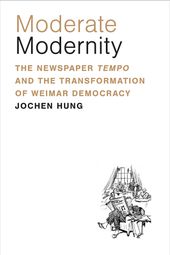
Moderate Modernity: The Newspaper Tempo and the Transformation of Weimar Democracy
The collapse of the Weimar Republic, Germany’s first liberal democracy, is still one of the most intensely debated topics in modern history. With Western democracies currently under pressure by populists and authoritarian regimes worldwide, the question why the Weimar Republic failed has acquired renewed urgency and relevance. In his book Moderate Modernity, Jochen Hung offers a new perspective on this question. Hung will discuss his new book and the meaning of Weimar democracy for today in conversation with Moritz Föllmer and Mario Daniels.
Focusing on the fate of the Berlin-based newspaper Tempo during the 1920s and 1930s, Jung’s new book chronicles the transformation of a vibrant and liberal society into an oppressive and authoritarian dictatorship. Tempo proclaimed itself as “Germany’s most modern newspaper” and attempted to capture the spirit of Weimar Berlin, giving a voice to a forward-looking generation that had grown up under the Weimar Republic’s new democratic order. It celebrated modern technology, spectator sports, and American consumer products, constructing an optimistic vision of Germany’s future as a liberal consumer society anchored in Western values. However, under the mounting economic and political crises of the early 1930s, the newspaper gradually developed a much more reactionary and illiberal voice.
The case of Tempo and its discursive fluctuation between democratic and illiberal values shows that the idea of Weimar politics as a standoff between pure democrats on the one hand and rabid extremists on the other does not do justice to the historical complexity of the period. Rather, we need to accept the Nazis as a lethal product of a German democracy itself. The history of Tempo teaches us how liberal democracies can create and nurture their own worst enemies. During this event, Jochen Hung will discuss his new book and the meaning of Weimar democracy for today in conversation with Moritz Föllmer (UvA) and Mario Daniels (DIA).
About the speakers
Jochen Hung is Assistant Professor of Cultural History at Utrecht University. His research focuses on the relationship between media, culture and society in modern history. He has published on gender representations in interwar culture, German-Jewish publishing and national identity, and youth culture in the Weimar Republic. Hung received his PhD in 2013 from the University of London (School of Advanced Study). His work was awarded the joint Essay Prize of the German History Society and the Royal Historical Society in 2012. He is also a regular contributor to international publications, including The Guardian, the BBC, the Washington Post and Die Zeit.
Moritz Föllmer is Associate Professor of Modern History at the University of Amsterdam, having previously taught at the University of Leeds and the Humboldt University Berlin. Among his many publications on twentieth-century German history are Individuality in Berlin: Self and Society from Weimar to the Wall (Cambridge UP, 2013) and Culture in the Third Reich (Oxford UP, 2020).
Mario Daniels is the DAAD-Fachlektor of the Duitsland Instituut Amsterdam. He holds a PhD from the University of Tübingen, taught at the Universities of Tübingen and Hannover, and was twice a research fellow at the German Historical Institute in Washington, D.C. From 2015 to 2020 he was the DAAD Visiting Professor at the BMW Center for German and European Studies at Georgetown University. His latest book, co-authored with John Krige, Knowledge Regulation and National Security in Postwar America, was published with University of Chicago Press in April 2022.

:rgb(-15)

:rgb(-25)

:rgb(8)
